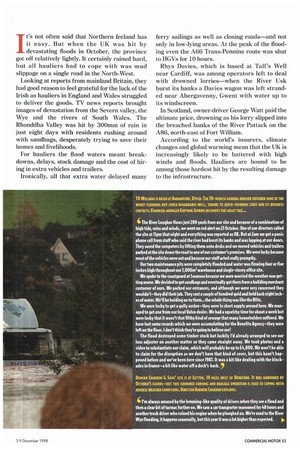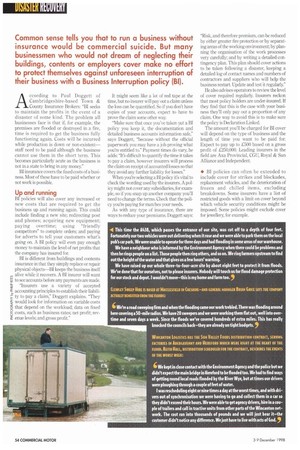Rhys Davies, which is based at Taff's Well near Cardiff,
Page 55

Page 56

If you've noticed an error in this article please click here to report it so we can fix it.
was among operators left to deal with drowned lorries—when the River Usk burst its banks a Davies wagon was left stranded near Abergavenny, Gwent with water up to its windscreen.
In Scotland, owner-driver George Watt paid the ultimate price, drowning as his lorry slipped into the breached banks of the River Pattack on the A86, north-east of Fort William.
According to the world's insurers, climate changes and global warming mean that the UK is increasingly likely to be battered with high winds and floods. Hauliers are bound to be among those hardest hit by the resulting damage to the infrastructure.
TD WILLIAMS IS BASED AT ANMANFORD, DKED. THE 10-VEHICLE GENERAL HAULIER SUFFERED SOME OF THE WORST FLOODING BUT COPED REMARKABLY WELL, THANKS TO QUICK-THINKING STAFF AND ITS BUSINESS CONTACTS. FINANCIAL MANAGER GWYNKE JENKINS RECOUNTS THE SOGGY TALE...
The River Loughor flows just ZOO yards from our site and because of a combination of high tide, rains and winds, we went on red alert on 23 October. One of our directors called the site at 1 lpm that night and everything was reported as OK. But at Zam we got a panic phone call from staff who said the river had burst its banks and was lapping at our doors. They saved the computers by lifting them onto desks and we moved vehicles and trailers parked at the site down the road to one of our customer's premises. We were lucky because most of the vehicles were out and because our staff acted really promptly.
Our two maintenance pits were completely flooded and water was flowing four or five inches high throughout our1,000m warehouse and single-storey office site.
We spoke to the coastguard at Swansea because we were worried the weather was getting worse. We decided to get sandbags and eventually gotthem from a building merchant customer of ours. We packed our entrances, and although we were very concerned they wouldn't—they did their job. They cost a couple of hundred quid and held back eight inches of water. We'll be holding an to them...the whole thing was like the Blitz.
We were lucky to get a gully sucker—they were in short supply around here. We managed to get one from our local Volvo dealer. We had a squelchy time for about a week but were lucky that it wasn't that filthy kind of sewage that many householders suffered. We have lost some records which we were accumulating for the Benefits Agency—they were left on the floor. I don't think they're going to believe me!
The flood destroyed some timber stock but luckily I'd already arranged to see our loss adjuster on another matter so they came straight away. We took photos and a video to substantiate our claim, which will probably be up to 4,000. We won't be able to claim for the disruption as we don't have that kind of cover, but this hasn't happened before and we've been here since 1981. It was a bit like dealing with the blockades in France—a bit like water off a duck's back.
DUNCAN (AKRON ET SONS' SITE IS AT LETTON, 10 MILES WEST OF DEMOB. IT WAS MAROONED BY OCTOBER'S FLOODS—BUT THIS COMBINED FARMING AND HAULAGE OPERATION IS USED TO COPING WITH ADVERSE WEATHER CONDITIONS. DIRECTOR ANDREW CAMERON EXPLAINS:
I'm always amazed by the lemming-like quality of drivers when they see a flood and then a clear bit of tarmac further on. We saw a car transporter marooned for 141 hours and another truck driver who ruined his engine when he ploughed on. Were used to the River
Wye flooding, it happens seasonally, but this year it was a lot higher than expected. 01.
Common sense tells you that to run a business without insurance would be commercial suicide. But many businessmen who would not dream of neglecting their buildings, contents or employers cover make no effort to protect themselves against unforeseen interruption of their business with a Business Interruption policy (BI).
According to Paul Doggett of Cambridgeshire-based Town & County Insurance Brokers: "BI seeks to maintain the profits in the event of a disaster of some kind. The problem all businesses face is that if, for example, the premises are flooded or destroyed in a fire, time is required to get the business fully functioning again. Costs will be incurred while production is down or non-existent— staff need to be paid although the business cannot use them in the short term. This becomes particularly acute as the business is not in a state to bring in any money."
BI insurance covers the fixed costs of a business. Most of these have to be paid whether or not work is possible.
Up and running
BIpolicies will also cover any increased or new costs that are required to get the business up and running again. This could include finding a new site; redirecting post and phones; acquiring new equipment; paving overtime; using "friendly competitors" to complete orders; and paying for adverts to tell your customers what's going on. A BI policy will even pay enough money to maintain the level of net profits that the company has insured fot
BI is different from buildings and contents insurance in that they simply replace or repair physical objects—BI keeps the business itself , alive while it recovers. A BI insurer will want to see accounts before any payments are made.
"Insurers use a variety of accepted 1 saccounting principles to establish their liabili ty to pay a claim," Doggett explains. "They i swould look for information on variable costs <
gthat depend on the workload; data on fixed t5 costs, such as business rates; net profit; revenue levels; and gross profit."
It might seem like a lot of red tape at the time, but no insurer will pay out a claim unless the loss can be quantified. So if you don't have copies of your accounts, expect to have to prove the claim some other way "Make sure that once you've taken out a RI policy you keep it, the documentation and detailed business accounts information safe," says Doggett, "because without the official paperwork you may have a job proving what you're entitled to." Payment times do vary he adds: "It's difficult to quantify the time it takes to pay a claim, however insurers will process the claim on receipt of accounted losses so that they avoid any further liability for losses."
When you're selecting a BI policy it's vital to check the wording used by the insurers. A policy might not cover any subsidiaries, for example, so if you snap up another company you'll need to change the terms. Check that the policy you're paying for matches your needs.
As with any type of insurance, there are ways to reduce your premiums. Doggett says: "Risk, and therefore premium, can be reduced by either greater fire protection or by separating areas of the working environment; by planning the organisation of the work processes very carefully; and by writing a detailed contingency plan. This plan should cover actions to be taken following a disaster, keeping a detailed log of contact names and numbers of contractors and suppliers who will help the business restart. Update and test it regularly."
He also advises operators to review the level of cover required regularly. Insurers reckon that most policy holders are under-insured. If they find that this is the case with your business they'll only pay out a proportion of any claim. One way to avoid this is to make sure the policy is Declaration Linked.
The amount you'll be charged for BI cover will depend on the type of business and the length of time you want to be paid for. Expect to pay up to £500 based on a gross profit of £250,000. Leading insurers in the field are Axa Provincial, CGU, Royal & Sun Alliance and Independent.
• BI policies can often be extended to include cover for strikes and blockades, replacement vehicles, and the deterioration of frozen and chilled items, excluding breakdowns. Some insurers have a list of restricted goods with a limit on cover beyond which vehicle security conditions might be imposed. Some policies might exclude cover for jewellery, for example.
4 This time the A438, which passes the entrance of our site, was cut off to a depth of four feet. Fortunately our two vehicles were out delivering when it rose and we were able to park them on the local pub's car park. We were unable to operate for three days and had flooding in some areas of our warehouse.
We have a neighbour who is informed by the -Environment Agency when there could be problems and then he rings people on a list. Those people then ring others, and so on. We ring farmers upstream to find out the height of the water and that gives us a few hours' warning.
We have raised up our whole three-to-four-acre site by about eight feet to protect it from floods. We've done that for ourselves, not to please insurers. Nobody will touch us for flood damage protection for our stock and depot. I wouldn't move–this is my home and farm too, CLIWLEY SWEEP KIRI 15 BASED AT MACCLESFIELD IN CHESHIRE—AND GENERAL MANAGER BRIAN GRICE SAYS THE COMPANY ACTUALLY BENEFITED FROM THE FLOODS:
We're a road sweeping flnn and when the flooding came our woric trebled. There was flooding around here covering a 50-mile radius. We have Z 0 sweepers and we were working them flat out, well into overtime and seven days a week. Since the floods we've covered hundreds of extra miles. This has really knocked the councils back–they are already on tight budgets. 9 WINCANTON LOGISTICS HAS Tilt SUM VALLEY FOODS DISTRIBUTION CONTRACT, SERVING FACTORIES IN KBERGAVIiiNY AND KERIFORD WHICH WERE RIGHT AT THE HEART OF THE FLOOD. KEITH HALL, DISTRIBUTION SCHEDULER FOR THE CONTRACT, DESCRIBES THE EVENTS OF THE WORST WEER: 'We kept in close contact with the Environment Agency and the police but we didn't expect the main bridge in Hereford to be flooded too. We had to find ways of getting round local roads flooded by the River Wye, but at times our drivers were ploughing through a couple of feet of water.
I was rescheduling eightor nine times a day at the worsttimes, and with drivers out of synchronisation we were having to go and collect them in a car so they didn't exceed their hours. We wereable to get agency drivers, hire in a couple of trailers and call in tractive units from other parts of the Wincanton network. The cost ran into thousands of pounds and we will just bear it–the customer didn't notice any difference. We just have to live with acts of God. 9






















































































































